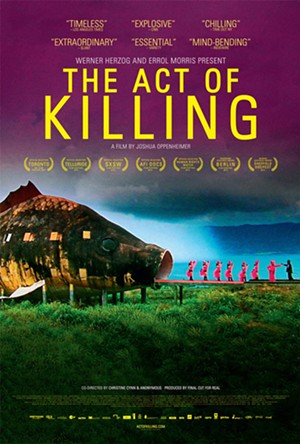Unrepentant Cutthroats: Joshua Oppenheimer Leaks Indonesia’s Genocide

At once the most micro and meta combination of cinéma vérité, documentary, and docudrama filmmaking techniques ever assembled, Joshua Oppenheimer’s “The Act of Killing” is an earth-shattering cinematic experience.
A challenging movie to throw into any cocktail party discussion, its parameters are deceptively straightforward but also wildly ambitious. It helps to know in advance that Errol Morris and Werner Herzog agreed to executive produce the film based on its remarkable merits.
The 1965 – 1966 genocide of more than half a million accused “communists” [ethnic Chinese, intellectuals, and union organizers] in Indonesia by right-wing paramilitary and freelance death squads — many consisting of self-proclaimed “gangsters” (a.k.a. “free men,” really unemployed racists) — serves as the stepping-off point for Oppenheimer to inspire, enable, and encourage a handful of aging remorseless killers to dramatize their heinous deeds with whatever artistic trappings they choose. A shadowy film-noir set, or a cheesy take on a ‘60s era American war movie, gives the former executioners artistic cinematic opportunities to act out stylized versions their ideal selves when they tortured and killed thousands of men by hand for the fun of it. One sequence finds the killers dressed up as gaudy cowboys seemingly inspired by “Lust in the Dust,” Paul Bartel’s campy western farce. They even have a drag queen in the group who acts as a gunsel to the gang.
The leader of one such gang is Andrew Congo, a grandfather with a skinny frame and thinning grey hair living in the town of Medan in North Sumatra. Congo fancies himself a cross between Al Pacino and Robert De Niro. He breaks into a cha cha routine on the patio where he personally killed hundreds of men either by shooting or by strangling with a long sturdy piece of wire fixed to a pole at one end, and with a wood handle at the other.
Joshua Oppenheimer was cornered by Indonesian authorities into reinventing his initial concept for the film after being repeatedly arrested — along with his crew and original group of interview subjects. The filmmaker’s attempt to tell the story of the genocide by interviewing surviving family members and friends was made impossible by Indonesian authorities intent on preventing any such document from ever being created. Oppenheimer craftily turned the repressive atmosphere by working with the oppressors rather than directly with the victims. The result provides a uniquely cinematic mirror that allows the criminals to indict themselves in a way that their accusers never could.
The film’s provocative title echoes throughout the movie in expanding meaning. “Killing” as an “act” takes on a host of different subjective and objective definitions from the personal to the political. Congo and his equally culpable associates retain their gangster bond nearly 40 years after their punishment-free crimes. They gleefully orchestrate and perform peacefully symbolic movements in nature, before a giant waterfall to the strains of “Born Free.” No amount of description can prepare an audience for the sickening levels of surreal irony of witnessing Congo and his men act out staged scenes of the violence they perpetrated against their neighbors, friends, and associates.
A guest appearance by Congo on an Indonesian television talk show — complete with a female teenybopper host — reveals how the public discussion of the genocide is openly discussed and celebrated for achieving its desired effect of silencing any and all dissenters. Fox news has nothing on Indonesian television.
In another clip, an aging gang member gleefully brags about killing his Chinese girlfriend’s father back in the day. Another gangster defends his belief in the atrocities he committed and his willingness to be brought up before a war crimes tribunal at The Hague for the fame it will bring him. “The Act of Killing” is a transforming movie. Every audience will be affected differently, but every single one will be changed by it.
Not Rated. 122 mins. (A+) (Five Stars – out of five/no halves)






